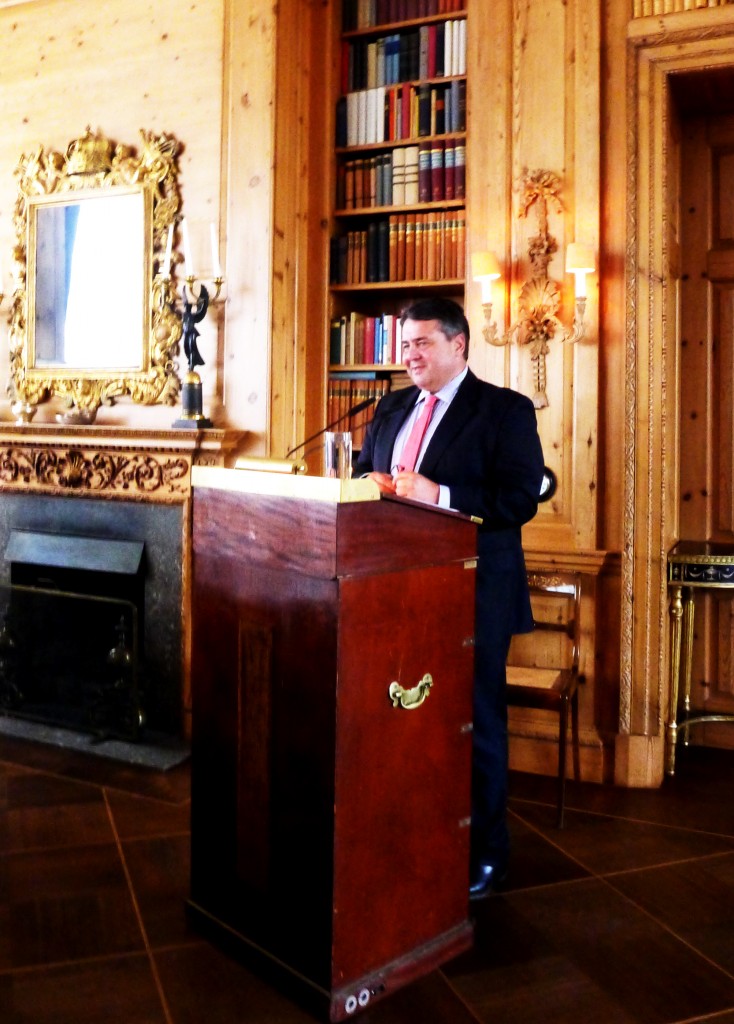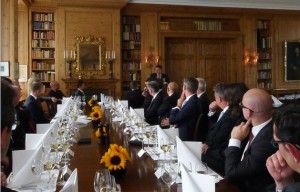Let’s Stick Together
VICE-CHANCELLOR Gabriel on Germany’s responsibilities
When we talk about freedom and human rights and how to defend or revive them in real instances, then amid all the threats and shocks we see today, policy, the media and business need a space where they are firmly anchored. Only when one’s viewpoint is clear can one gain a perspective on conflicts such as that in Ukraine today.
For decades, one term represented this anchor for policy and its standpoint in the democratic world: “the West.” Transatlantic relations, and especially between Germany and the US and Canada, the NATO alliance and the European Union, were an expression of the common ground shared by states and regions that felt they belonged to “the West.”
The pledges of “the West”
They considered themselves part of a community of values that wanted to be more than a shared economic or geostrategic alliance. “The West” espoused the universal promise of freedom and equality for the individual, respect for human rights and the right of democratic participation, protected by written or unwritten constitutions and the rule of law. For the great majority of its states and citizens, the community of values of “the West” was for a long time a relatively steady political and cultural compass. In recent years we have been rocked by a considerable number of international crises that were unable to harm Germany’s economic prosperity. No one talks anymore about the once proverbial “German angst”.
Still, alongside this image a new counter-image of new insecurities now exists that cannot be blurred by German growth statistics. Since the collapse of the financial markets the Eurozone, and with it the European Union, has been subjected to an unprecedented political test of the limits of European solidarity. The core of the Union is developing unmistakable cracks as destabilization along the European periphery advances. Syria has descended into a hellish civil war with many thousands of people killed and millions displaced. Every day in Iraq we see the consequences of a US intervention that broke international law and the subsequent pullout. The Middle East, always religiously and nationalistically incendiary, sees limited truces but no durable peace. Turkey, meanwhile, is torn between the participatory demands of a protesting generation and the desire for social peace. Ever since the revelations of Edward Snowden – at the latest – we have also known that, in an alliance with internationally active intelligence services, private-sector data monopolists have been working to compromise private citizens’ control over their own information. The ability to completely know and monitor the individual was long a dark genre of literature before approaching reality in the 21st century.
Fundamental questions
The far greater consequence has been, however, that our fundamental political values have been called into question: of refraining from the use of force, of the inviolability of borders, of resolving conflict through negotiation and de-escalation, and finally of freedom and human rights. In union and allied with other Europeans we must take seriously what is taking place in Europe and its vicinity.
All this has become vividly apparent ever since the good news from the Maidan in Kiev – that the firing upon demonstrators had stopped, a democratic constitution was again in force and elections held – has been replaced by concerns that military confrontation is continuing. Seemingly all at once we have been torn from our observer’s perch into a long-simmering and suddenly explosive conflict that is now demanding a price from Germany in the form of sanctions against Russia.
At its core the issue is what should constitute order for the states of Eastern Europe and what model we can offer to other regions neighboring the European Union. Ukraine’s current ordeal, as well as those in other conflicts in the European neighborhood, ultimately pits civil rights and the rule of law against allegiance to an ethnic, sectarian or linguistic community.
It has always been easy to counterpoise “the West” against the rest of the world culturally. Although what’s at stake is not any claim to dominion by a geographically regional culture that would tell others what to do, but the opposite: the universal validity of an entitlement for all humanity to political freedom and self-determination. That is also precisely why the scandalously unlawful practices of the NSA and the conduct of big Internet corporations striving for complete access to personal data are violations of the Western community of values. That is also why Big Money’s ruthless pursuit of privilege in a system of deregulated financial markets undermines the rule of law in Western states. That is why a Europe that sees itself as only a forced collective under a common currency remains far removed from its true goals. Because it has come to symbolize much more than culture or geopolitics, “the West” has not outlived its usefulness.
A partnership of convenience?
The universal nature of its principles lends power to its message that the individual’s human rights are inviolable. In today’s dangers and shocks, policy needs a place where it can anchor. Germany is not stuck between two powers. As a democracy our country belongs to an international community that still upholds the universal promise and right of political freedom.
That is why we now have to again strengthen this community of values – not only internally, but also externally. We cannot be indifferent when, regarding the European conflict over the integrity of Ukraine, commentators in authoritarian states point out almost mockingly that “the West” upholds its values only as long as its economic interests remain untouched. This viewpoint makes clear that we are increasingly being regarded as an economic partnership of convenience. Europe now has the chance to demonstrate the opposite. What will change the attitude towards “the West” is a series of actions: Supporting democrats in Ukraine economically and politically, investing sustainably and over the long term in the country’s development and, if needed, being prepared in the face of continued Russian aggression to give up economic privileges in our relations with Russia until conflicts on our continent are again resolved at the negotiating table and the security of all of Europe’s neighboring states is achieved. It will change our attitude, since in recent years we too have supplanted the universality of Western values through the universality of globalized economic thinking and conduct. And it will change the attitude from the outside toward “the West” as a partner to be taken seriously that is more than a profit alliance of cowardly moneybags.
This article is based on a speech held by Sigmar Gabriel during an event of the JEWISH VOICE hosted by Axel Springer SE in the Journalist Club in Berlin
------------------------------------------------------------
Kommentar:
VICE-CHANCELLOR Sigmar Gabriel is next in line to take over from Angela Merkel pending the outcome of the election next year. I think no further comments are necessary!
Administrator
THE OTIUM POST




No comments:
Post a Comment
Enter your comments here: